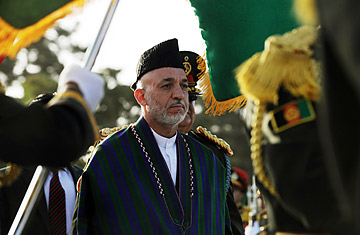
Afghan President Hamid Karzai returns from inspecting the guard of honor during Independence Day celebrations at the Defence Ministry in Kabul on Aug. 19, 2009
In the good old days, Afghan President Hamid Karzai would dial into a weekly videoconference call with his buddy George W. Bush. No longer. The Obama Administration cut Karzai's direct access to the White House earlier this year. The new Administration views Karzai's corrupt and flailing presidency as a big reason that the Taliban and al-Qaeda are regaining so much ground in Afghanistan.
Last month's presidential election was meant to help that. Democracy, at least, was one thing that the U.S.-led forces in the central Asian nation had managed to make work. Instead, the polls have turned into a disaster. Opposition politicians and Western diplomats allege epic-scale ballot-box stuffing, mainly by — but not exclusively — supporters of Karzai. The U.N. says votes in districts where fraud is proved to have taken place should be annulled. Afghanistan's Electoral Complaints Commission has ordered a partial recount of the vote, citing "clear and convincing evidence of fraud." Karzai's closest challenger, Abdullah Abdullah, a former Foreign Minister, decried the vote as "state-engineered fraud."
Yet whether he wins in the first round or is forced into a runoff with Abdullah, Karzai will almost certainly stay in power. That means Washington must continue to deal with him.
The problem is, Karzai's legitimacy is shot. Even before the election, many Afghans (though perhaps not a majority) were angry with him over his failure to curb a system of corruption and patronage that had paralyzed efforts to repair the war-thrashed nation. The international aid community is disheartened by the prospect of another five years of a government that is infested with warlords and drug traffickers. And Washington is fed up with Karzai's duplicity and fecklessness. Despite the fact that he came to power on the back of the U.S.-led invasion of Afghanistan, Karzai used the latest poll as a chance to portray himself as the one Afghan willing to stand up and criticize the way U.S.-led coalition forces have inflicted civilian casualties while chasing the Taliban. "Karzai wants his legacy to be an Afghan leader who stood up against the foreigners," says Haroun Mir, director of Afghanistan's Center for Research and Policy Studies. "He also thinks the international community is trying to undermine him."
Public opinion in both the U.S. and Europe is tiring of bad news from Afghanistan. President Obama faces questions from both the left and right. What is the point of pouring more troops or billions of dollars into Afghanistan, his critics say, when the Taliban seem to be gaining ground and the money simply vanishes into the baggy pockets of Kabul officials?
But if the U.S. quit on Karzai, the result would be disastrous for both Afghanistan and the U.S., says Ashraf Ghani, a U.S.-educated presidential contender. "If the U.S. leaves, it will be 'dog eat dog' here. We'll be the human zoo of the region," says Ghani. Like other Afghan intellectuals, Ghani foresees a grisly scenario in which the Taliban sweeps into Kabul, taking revenge on thousands of "collaborators" who helped Karzai and the Americans. Millions of ordinary Afghan citizens — including those who embraced the Western promises of education for girls, democracy and a place for Afghanistan in the 21st century — would flee the country.
Al-Qaeda, meanwhile, would return on a red carpet. "All these fancy new villas in Kabul where the diplomats and the rich businessmen live? They'll go to al-Qaeda families," says Mir, adding that a "defeat" of the U.S.-led forces here would be a boon to Muslim extremists around the world, much as the Soviet army's retreat from Afghanistan was during the late 1980s.
To keep that from happening again, Karzai will need to show results — and fast. For starters, Afghans say he must dismiss corrupt officials, enforce law and order, and use foreign-aid money to build the roads, dams, bridges and schools that he and the international community have long promised but never delivered. This would win back many Afghans and stall the Taliban's advance. But it won't be easy. To secure victory in the recent election, the President had to indebt himself to the very warlords who are strangling the country with their greed.
